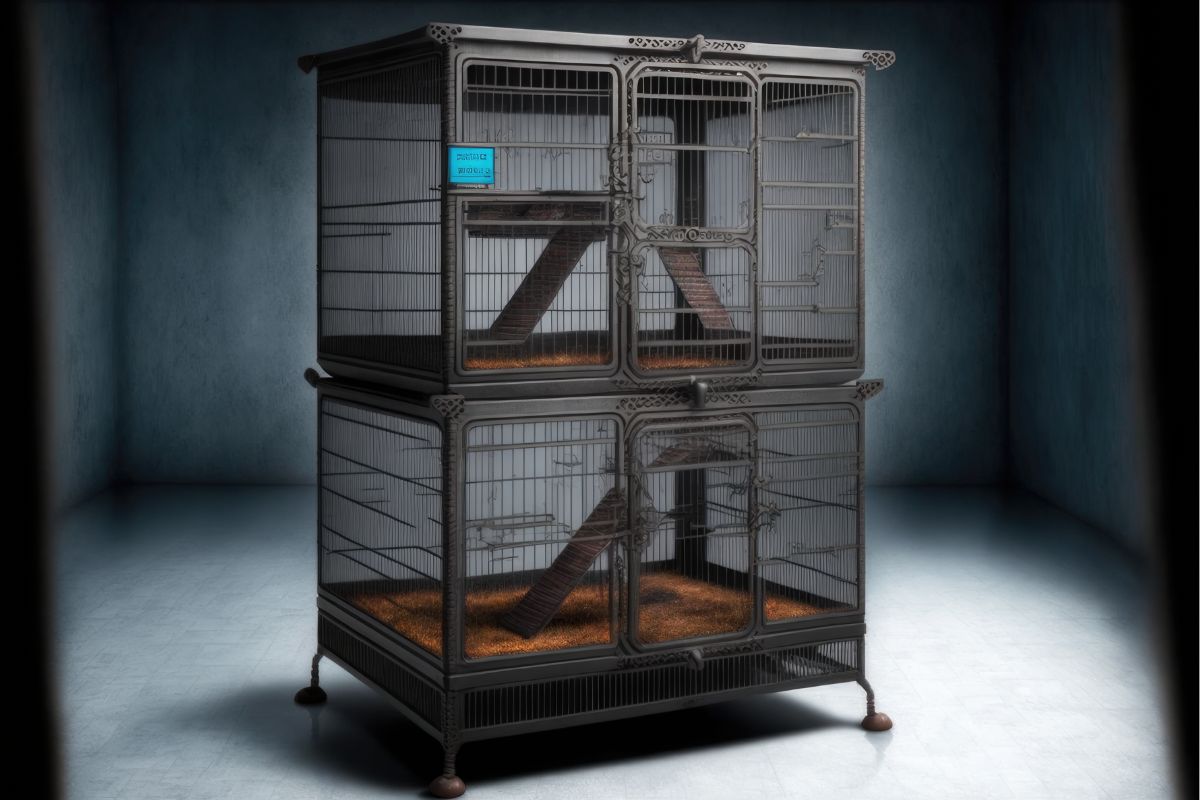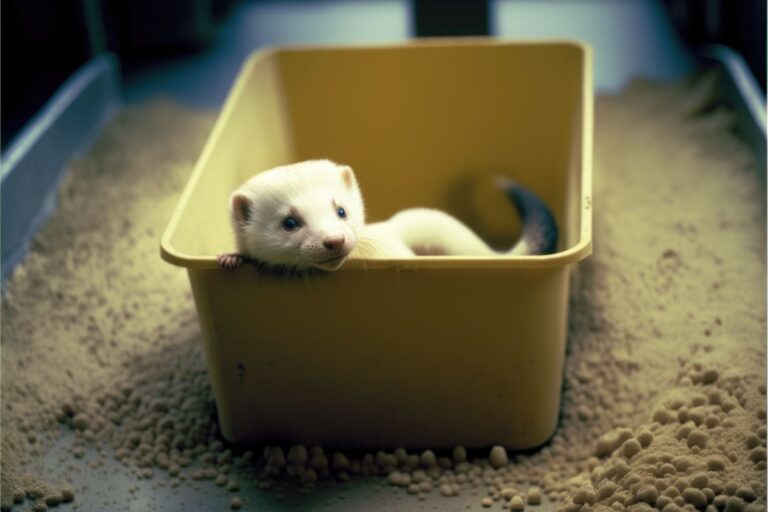How to Clean Your Ferret’s Cage. Use this Method

Cleanliness is as important to ferrets as it is to us. This is especially true when it comes to the health of your pet ferret. Therefore, you must clean your ferret’s cage and living environments regularly. Some ferret owners complain about having a distinctive smell in the house. It is not a very nice odor, to say the least.
However, dirty cages and bathing your ferret are the common reasons for the awful smell. Cleaning your cage at least every day and washing up everything weekly is recommended. Ferrets can be quite messy with their food and water, which could spill on the floor.
Besides cleaning regularly will ensure keep your ferret from health issues from contaminated items. You will need to clean the floor, cage bars, food, and water bowl to remove all the food residues. So before you can blame your ferret for the musky odor in your house, make sure you clean his cage often.
Tools you might need to clean your ferret’s cage
Cleaning your ferret’s cage is only going to take a few minutes to complete. You can do it a lot faster when you have the right set of tools. For starters, you will need an extra cage, which does not have to be as large.
Put your furry buddy into the extra cage when you are set to begin cleaning. Note that you cannot let your ferret free in the house as you clean. This would mean he is unsupervised and he could be destroying your stuff, or trying to get away.
The next thing you are going to require is a bucket of water and washcloth. Make sure you use a disinfectant in the water. Also, use some soap to wash the food and water bowls. Rinse them with clean water and put them aside.
Use a brush to sweep away any food remains from the cage. Use a smaller brush, probably a used toothbrush to remove dirt in the corners of the cage. As I mentioned earlier, ferrets can make quite a mess with their foods. Besides, we use the free feeding method on ferrets due to their fast metabolism rate.
Use the washcloth dipped in disinfected water to clean up the cage. Mop the floor well and do not forget to clean the cage bars. Pay attention to the corners of the cage and ensure that you get rid of all food particles.
Also, wash the beddings and all the toys to get rid of any odor in the cage. You can hand wash them or use a machine to clean up. To carry out all these activities, I suggest you put on latex gloves for your protection. After all, you do not want to spread germs or viruses from cleaning up your ferret’s cage.
Only put him back in the cage after it is dry. I mean, you would not love living in damp environments and neither does your ferret.
Let’s talk about your cleaning schedule
Cleaning up your ferret’s cage is a great way to take care of him and his hygiene. However, you cannot manage to be doing this every day. It can become tiring at some time. Therefore, you need to set up a cleaning schedule immediately you bring your ferret home.
I suggest you clean his bowls every day. You most definitely do not want your house to stink simply because you keep an adorable pet. Use soap and water to clean his feeding and drinking bowls.
Also, I suggest you remove his beddings every day. Understand that most of the ferret odor comes from their natural glands on his skin and anal glands. The smell from his area could be because of the secretions from his body onto the beddings.
It gets worse when your ferret is intact. Animals use their scents to communicate with each other. When in heat, your intact ferret could produce the musky awful smell. Speak to your vet and get him neutered immediately.
Do not forget to scoop the litter box every day. If you can, I suggest you scoop soiled litter every time your ferret goes to the box.
This is how your basic cleaning schedule should look like.
Now, you should do a general cleaning routine every week. This will see you clean the cage as explained above. Clean up thoroughly every week to remove any musky smell from your ferret’s cage.
You can wash his cage in the bathroom sink. I advise against using the kitchen sink strongly. It would not be healthy to use the same sink that you use for your food utensils.
Even after doing all this, you may not be able to get your ferret’s cage to stop stinking. It could probably be coming from your ferret! Sad but it is true that ferrets have a musky smell. As I mentioned earlier, ferrets have glands on their bodies that produce this odor. It is time to deal with the smell from your ferret’s body!
Bathing your ferret
The musky smell in your house could be your ferret! Have you bathed him recently? Well, while bathing your ferret help remove the bad odor from the house, too much of it may make it worse. They do not need to take a bath as often as we do. I advise you to wash him at least once a month.
So how is it that washing your ferret could make the smell worse? Well, just as we do, ferrets produce natural oils from their skin. The skill will keep the coat healthy and smooth. However, bathing your ferret rids his skin of these oils. As a result, his skin will produce more oil to make up for the lost skin oil.
One more thing to note is that you should let him use the litter box before you dip him in his bathwater. You do not want him to ruin the water with his poo or pee in the process.
At the end of the day, there will be too much smell from the skin glands all from bathing him too often. Restrict baths to at most once in a month. Use warm water and get shampoo specifically made for ferrets or kittens to bath your ferret.
Bring all the things you will need to give your ferret a bath. These may include warm water, shampoo, and a towel. Bring your ferret and put him in the warm bath water you prepared. As you wash dirt from his skin, pay attention to his coat and skin. It is easy to notice any bruises or any other skin problems when he is soaked in water.
Be careful not to let shampoo get in your ferret’s eyes during bath. Well, it could be irritating and cause your ferret to move frantically in the water, turning bath time into a disaster. Well, you cannot leave your ferret in the water unsupervised.
Once clean, rinse the lather off his body with clean water. Dry him using a towel and leave him to dry naturally.
Even after your bath and clean your ferret’s cage and you can still smell his odor, then you have to go more into detail. Particularly, ferrets have waxy ears that could contribute to the musky smell.
Cleaning your ferret’s ears
If the smell won’t go away after bathing and cleaning after him, check his ears. Start by cleaning his visible folds gently and thoroughly. Then use cotton swabs to clean his inner parts of the ear. For this, you need to hold your ferret steady and drive the swab into his ear.
You need to be gentle with his ears as a cotton swab could easily hurt him. Twist it into the ear in a perpendicular angle and scoop the ear wax from the ears. It takes more than 3 cotton swabs to clean one ear as ferrets have waxy ears.
Do not stop cleaning his ears until the swab comes out clean. Then repeat the same procedure for the second ear. Once again, I must remind you that you are responsible for your pet. I suggest you clean his ears every time you give him a bath.
Most ferrets do not stay still when cleaning their ears. Instead, you might have to hold him by his scruff. You should not drive the swab too deep to hurt his eardrums. I suggest you invite a friend to help hold your ferret as you clean his ears.
Nail care for your ferret
Ferrets are carnivorous and have sharp and strong claws. Domesticated ferrets will need their nails trimmed often. However, this is not always an easy thing to do. Your ferret is going to resist having his nails cut every time.
Leaving them untrimmed could lead to so much damage. He could tear his bedding and toys such as stuffed animals. He could also scratch you with his touch claws. Well, be prepared to trim his nails at least once a week since they tend to grow back fast.
If you have someone helping you hold him still, it becomes quite easy to trim his nails. Be careful not to cut in too deep and cause him an injury. Therefore, watch out for any veins, especially those that are visible through the nail.
As with the ears, it is easier to trim your ferret’s nails when you have someone holding him for you.
Conclusion
As we love living in clean environments, so do our pets. This makes it essential to ensure that your ferret enjoys the privilege of living in hygienic environments. To make sure that he does, you need to come up with a cleaning schedule. I have discussed this above, hoping that it is going to guide you to remove all the odor from your house.
Clean the entire cage every week. Sometimes you might also consider throwing away the litter in his boxes as it could be causing a foul smell in the house. Well, I also emphasize on cleaning his feeding and drinking bowls with soap and water every morning. Leave clean drinking water for your ferret every day.
If cleaning the cage is not enough to remove the smell, I suggest you bath your ferret. Do it once in a month as well as clean his ears.
You will still smell a slight scent of your ferret as it is only natural. You may use house fresheners to mask the ferret odor. After cleaning your ferret’s cage and bathing him, your house should not have an awful odor anymore.






